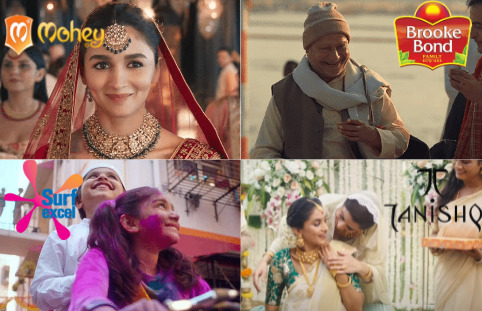Recently, Manyavar, an ethnic wear brand endorsed by the likes of Virat Kohli and Anushka Sharma in the past, decided to target Hindu marriage rituals in their new advertisement featuring Alia Bhatt. The ad specifically targeted the ‘Kanyadaan’ ritual followed in Hindu marriages. The advertisement is seen portraying ‘Kanyadaan’ as regressive practice and as an alternative; the ad suggests that Hindus should start a ‘Kanyamaan’. The word ‘maan’ translates to respect in English. Manyavar claimed that “Kanyamaan” was a progressive way of thinking as it highlights the idea of respecting brides instead of handling their responsibility to the groom’s family. Needless to say, the advertisement drew sharp criticism from the 21st century awakened Hindus, who are well aware of the tradition and its significance. The users also castigated brands for only targeting Hindu festivals while leaving out oppressive customs of other rituals untouched (Read: Triple Talaaq, Halala)
However, Manyavar is not the only company to come out with an advertisement that seemingly targets Hindu customs. Over the years, it has become a routine trope in the advertising industry to target Hindu rituals and engage in social media activism to gain a few measly woke points.
Brooke Bond and its appropriation of Kumbh Mela
In 2019, Brooke Bond released an ad where a son takes his frail elderly father to the Kumbh Mela and purposely leaves him amongst the crowd to get rid of him. Presumably, the son wanted to get rid of his father due to his old age and since there is no better way than dropping him off at an old age home or leaving him at a railway station, the creators of the ad chose Kumbh Mela as a plot device.
Over the years, for fun and gags, Kumbh Mela is referred to as a place where owing to the mass congregation of the devotees, people often get separated. However, using a folklore anecdote to drive the narrative came across as cheap, lazy, farcical, and incompetent. Not to forget, the subtle propaganda to demean the Hindu culture and horrible writing that had no connection with the product being advertised.
Hotstar- Anti-family advertisement
The ad seems like just another advertisement, but Hotstar is proclaiming that spending time with family is a futile task, and spending your time on OTT will be more beneficial. In this way, they have subtly depicted the family as the villain in an individual’s life.
Read more: Tanishq ad – Hindus have sent a strong message, the days of taking propaganda lying down are over
Cars24- Change your “man” like your “car”
In the same way, the left-wing intellectuals giving long speeches on women empowerment chose to remain silent when an e-commerce company named Cars24 is seen insulting men in the name of the advertisement. The ad shows that they will get a husband for a trial run and if they do not like him, he will be returned within 7 days. Imagine if the same dialogue was used for a woman, then? The Modi government would have been termed as misogynistic and an exponent of ‘oppressive patriarchy’
Surf Excel – after all, Hindus want to smear Muslims with colours on Holi
Perhaps, the most blatant of anti-Hindu ads was the one churned out by Surf Excel, the detergent brand famous for its’ Daag Acche Hai’ campaign. Taking a volta face on its campaign where Daag (stain) is termed good, the girl dressed in white clothes rides on a bicycle and challenges neighbourhood kids to splash her with Holi colours.
It is later revealed that it was to protect her Muslim friend who had to go to a nearby mosque for prayers. The parting note by the girl ends with a message “baad me rang padhega (will colour you later!)”.
The makers tried to monkey balance the ad with the parting statement but the damage had been done. Severe backlash ensued on the social media platforms and Surf Excel was given a lot of stick for pushing its dubious agenda through an ad.
In recent years, wokeism has engulfed the entire advertisement industry. They have been heavily criticised for various woke agendas like painting Hindu festivals as not being environmentally friendly; Hindu cultures and rituals as misogynistic; Brahmins as villains and presenting Hindu men as toxic.





























